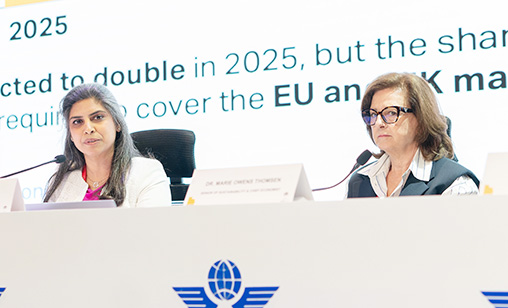Main Story
SAF production doubling this year
June 1st 2025
More Sustainable Aviation Fuel (SAF) is being produced in 2025 than last year, the International Air Transport Association (IATA) head of net zero research, Dr Preeti Jain, reported at the association’s June AGM. Read More » But the quantities are still less than 1% of total conventional jet fuel demand.
“We need an exponential increase in SAF production,” Jain said. The outlook takes into account that new commercial scale SAF refineries have begun production in 2025 with more expected to come by year-end. The IATA analysis said the 2025 SAF production estimate is achievable.
 |
In fact, in the near term, supply appears sufficient to meet demand. Price is a critical factor. Asia has the biomass feedstock and the technology necessary for SAF production with India, China and Indonesia critical sources for bio-resources. The Asia-Pacific has 28 SAF projects planned for production by 2030.
North Asia, by which IATA refers mostly to China and its market, has 13 projects being constructed. “China’s production capacity can be a great swing factor in the global SAF supply. Importantly, the country is progressing SAF with projects. If successfully deployed at scale, they can be an SAF game changer and a renewable success story,” Jain said.
IATA senior vice president sustainability & chief economist, Marie Owens Thomsen, said all governments must maximize renewable energy and renewable fuel production for all industries, not only for the airline industry.
“With the world relying on fossil fuels for over 80% of its energy consumption, it should be understood this is a whole-economy issue, and that no single industry can achieve this on its own.
“The top priority for all the stakeholders is to increase renewable energy and fuel production. In doing so, governments must be mindful of unintended consequences that often afflict new and immature markets, and take action to eliminate oligopolistic pricing behavior,” she warned.
“Looking at oil company profits, it is wholly unjustified to support their bottom lines with tax credits and handouts and it is inexplicable why such support is not provided to renewable energy companies.”
“If redirected, the US$ 1 trillion annually of favors to big oil could fund the energy transition in air transportation in less than five years.”
Anna Travers says:
September 17th 2025 03:14am